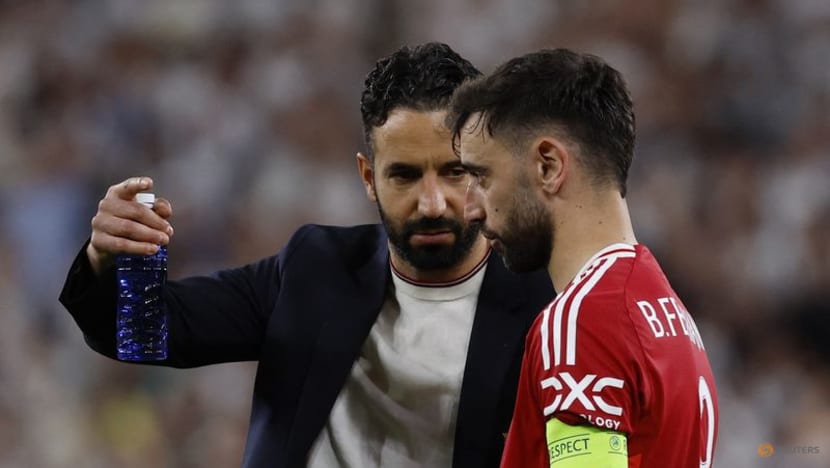With Manchester United’s worst season in recent memory ending in disappointment, manager Ruben Amorim is focusing on pride and perspective — while transfer rumors swirl around two of the club’s biggest names.

A turbulent end to a forgettable campaign
As Manchester United prepare to close the curtain on one of the most dismal seasons in the club’s modern history, the atmosphere at Old Trafford remains thick with uncertainty. On the eve of their Premier League finale against Aston Villa, head coach Ruben Amorim stood before the media but offered little clarity on the futures of captain Bruno Fernandes and emerging talent Alejandro Garnacho.
The press conference, held just days after United’s painful 1-0 loss to Tottenham in the Europa League final, underscored the volatility surrounding the club. That defeat not only cost United a chance at silverware but also confirmed they would not be playing in Europe next season — a rare and sobering reality for one of England’s most decorated sides.
The mood among players has been equally strained. Fernandes, visibly frustrated after the final, admitted publicly that his future at United was in doubt. Reports have since emerged linking the Portugal international with a blockbuster £100 million move to Saudi Arabian side Al-Hilal. Garnacho, for his part, made his feelings known through a pointed social media post, lamenting his limited role in the final despite contributing heavily throughout the Europa League campaign.
Amorim stays focused amid speculation
Despite the mounting speculation, Amorim declined to be drawn into the media’s questions about the potential departures of Fernandes or Garnacho. “I always speak to my players, but the focus now is on the last game,” the 40-year-old Portuguese manager said. “We have a plan and we prepared for both situations, with Champions League and without. Now we have to focus on the last game.”
His tone was measured, even as the magnitude of the club’s struggles hung heavy. United enter their final match sitting in 16th place — far below any preseason expectations. Their failure to secure a European berth for next season marks a significant regression, even for a club already in transition.
Amorim didn’t sugarcoat the campaign, calling it “really hard.” But he insisted that the team remained determined to finish with some sense of dignity. “It was very tough and it still is,” he said of the Europa League final. “It was harsh for us to lose that game. We were the better team, we had more chances. But now, we have to end the season in a good way.”
The weight of missed opportunity
Manchester United had hoped the Europa League would offer a late lifeline, both in terms of silverware and European qualification. Instead, the loss to Tottenham served as a final blow in a season already filled with missteps. Garnacho’s disappointment is emblematic of a broader feeling among players and fans alike: this was a year of squandered potential.
The young Argentine winger, a breakout performer in several key fixtures, played just 20 minutes in the final. His cryptic post, “I don’t know,” in reference to his future at the club, sparked alarm among supporters who have grown attached to his energy and flair. That such uncertainty surrounds a young star considered part of the team’s long-term vision is troubling for a club already in flux.
Fernandes, the team’s emotional leader, faces a different kind of crossroads. A bid in the region of £100 million could tempt United’s decision-makers — particularly with no European revenue to rely on. Amorim’s silence on the matter may signal internal deliberations yet to be resolved.
No regrets, but much to repair
Amorim’s own position has come under scrutiny as well. After the Europa League final, he made headlines by stating he would step down without compensation if fans and the board no longer wanted him. On Saturday, however, his message was more optimistic.
Asked whether he regretted taking over mid-season, Amorim was adamant: “At this moment I’m really glad that I arrived six months before we started the new season. We avoided a lot of mistakes that would have happened next season. We have avoided a lot of suffering.” Indeed, Amorim joined United in November after leaving Sporting Lisbon at the top of the Portuguese league. Replacing Erik ten Hag was never going to be easy, and the challenges he’s faced highlight the club’s deeper systemic issues. While this season has been damaging in many ways, the early arrival of a new manager could provide the foundation for a more cohesive rebuild in 2025.
A final hurdle before the future begins
Sunday’s match against Aston Villa may not carry much weight for United in terms of standings, but it’s anything but meaningless. For Amorim, it’s a chance to close the book on a disastrous campaign with a performance that offers a glimmer of hope. For Fernandes and Garnacho, it may be a final chapter in their United stories — or the start of a new one under a manager still shaping his vision.
Villa, meanwhile, come into the game with everything to play for. Sitting sixth in the league and fighting for a Champions League spot, they represent a stark contrast to a United team playing for pride.
As the season ends, United are a club in limbo — no trophies, no European football, and questions swirling around key players. Yet within the uncertainty lies a rare opportunity: a clean slate, a chance to redefine what Manchester United represents in the modern game.




